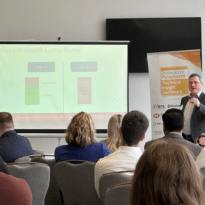Kate Hall, lead paraplanner, Para-Sols, looks at how the new Consumer Duty rules will affect the day-to-day aspects of the paraplanning role, in particular, the writing of suitability reports.
I’ll start by saying a paraplanner’s job is much more than just writing the report. It’s about absorbing yourself in the case and working towards the same outcomes as the adviser; essentially concluding what is best for the client, based on their objectives and circumstances. In this article, I’ll look at how the upcoming Consumer Duty will affect this process.
At its heart, Consumer Duty is about positive client outcomes. Report writing is about setting out advice in a clear and easily understandable way. But report writing, and paraplanning in general, also provides a ‘sense check’ as to whether the advice stacks up.
When writing a report, it’s easy to link up client objectives with the recommendations when the reasons why are clear (not necessarily simple, there may still be some technical reasoning behind it, but clear), and there is good quality research to back it up. It’s then also easier to evidence the positive outcome for the client, and the value that the advice is providing to the client. If it’s necessary to waffle on about the reasons for advice then it might be worth revisiting it, as well as the process and research that produced it, as they may not necessarily be the best choice for that particular client.
This also doesn’t necessarily need to wait until the report stage of the advice process. I feel one of the underused aspects of a paraplanner’s role is as a sounding board or second opinion for an adviser. The roles of the adviser and paraplanner are very different; we deal in facts and figures and can provide a different perspective on a situation and possible solutions. Or, dare I say it, point out any holes in the proposed advice (advisers, it’s annoying, we know, but you’d rather it’s us saying it than the FCA later down the line!). And it can help in catching any issues long before report stage.
This could either be through attending client meetings, or from separate discussions. It is also great in ensuring that the ‘link’ between the client’s situation and advice is communicated accurately in the report, and evidenced in writing (and not just floating up there in someone’s head – if it’s not in writing it didn’t happen!). It’s possible to paint a much truer picture of a situation, and explain the advice and the process of getting to it, if you have been involved throughout. In summary, the stronger the adviser/paraplanner relationship, the better the client outcomes!
Speaking of client outcomes, let’s look at one Consumer Duty outcome in particular: Consumer Understanding. Looking at the four outcomes, this is the big one (but by no means the only one!) to affect report writing itself. Ideally, you’ll have a suite of lovely templates to work from (and you can read more about how you can Consumer Duty-proof your templates here), however, it’s the paraplanner’s job to personalise the text and turn it into something that will help the client to understand the advice that they are being given. And as mentioned above, it’s our role to ask questions if something doesn’t make sense!
That is the main point of a suitability report; it’s the central tool in explaining what the advice is and why it is suitable, and it provides evidence that can be referred back to in the future (I’ll say it again: ‘if it wasn’t written down, it didn’t happen!’). There are of course things that must be included in a suitability report, but they shouldn’t be treated as a box ticking exercise. Let’s have a look at some tips, keeping the consumer understanding outcome in mind:
Starting from the basics, it’s been said time and again, but reports should be kept as concise as possible; it’s the quality of the information included that is important, not the quantity. Keep in mind that there should be a comprehensive file to back up the advice and the report, so every last piece of information does not need to be included in the report. Bombarding a client with information will just make them switch off or give up, and can hide the key points. So, stick to the important stuff!
Likewise, the language used should be simple and in plain English; this isn’t the time to show off your vocabulary vocation! Remember that the average reading age of an adult in the UK is 9 years old, and whilst by nature, suitability reports delve into some complex stuff, it’s the job of the paraplanner to try to explain these in a way anyone can understand. They need to be written in a way that encourages the client to read it, not stick it in a drawer to never be seen again.
Think of a good paraplanner being like a good teacher; they should be able to make something complicated feel more straightforward. There are tools that can help with this; alongside spelling and grammar checks, writing software will often provide a measure of the reading age/score of the document being reviewed. It’s also worth thinking about how you would explain something to a friend or family member.
The report should also be written with the person receiving it in mind; again, as paraplanners, we deal with a lot of facts and figures and it’s easy to get caught up in this. Consumer Duty reiterates that the client should be at the centre of the process, and adjusting the language used and the way that a sensitive situation is referred to in the report, for example, can make all the difference to the one reading it. Making sure that they only get the information they need will help!
So, in conclusion, Consumer Duty doesn’t only affect paraplanners on how we write reports, but should encourage us to use our skills to help provide the best customer outcomes overall. We work on the same team as the adviser in concluding what is best for the client, based on their objectives and circumstances.
Consumer Duty isn’t necessarily changing what we do, it is reminding us that at the centre of our process is a person who is just trying to reach their financial goals. Sometimes it can be easy to forget that while researching and finding exciting new products or a platform releasing a new feature. The whole point of financial planning is to help the client reach their goals in the best way for them. Consumer Duty is there to highlight that fact and ensure that everyone in the firm is working towards the best outcome for the clients. Paraplanners are invaluable in making that happen.






























